Study Looks at Reconnecting Riverfront and Columbus Park Down by the River
Published May 24th, 2023 at 10:04 AM
Above image credit: A new study wants to better connect the Berkley Riverfront with nearby neighborhoods including Columbus Park. (Kevin Collison | CityScene)After being neglected for much of the 20th century, the downtown riverfront is becoming a new community and now is looking for better ways to connect with nearby neighborhoods, including Columbus Park.
A connectivity study is underway with the goal of identifying ways to overcome obstacles posed by the busy rail corridor and highways that isolate the Berkley Riverfront Park area, and make it easier to access with an emphasis on bicycling, walking and mass transit.
“The Berkley Riverfront Connectivity Study will provide detailed planning and coordination to identify strategies… to create high-quality connections between the riverfront and its adjacent neighborhoods,” according to a funding application by the Mid-America Regional Council (MARC).
MARC and Port KC, which manages the downtown riverfront and controls most of its property, have released a survey asking people to provide their suggestions for how to better connect the area.
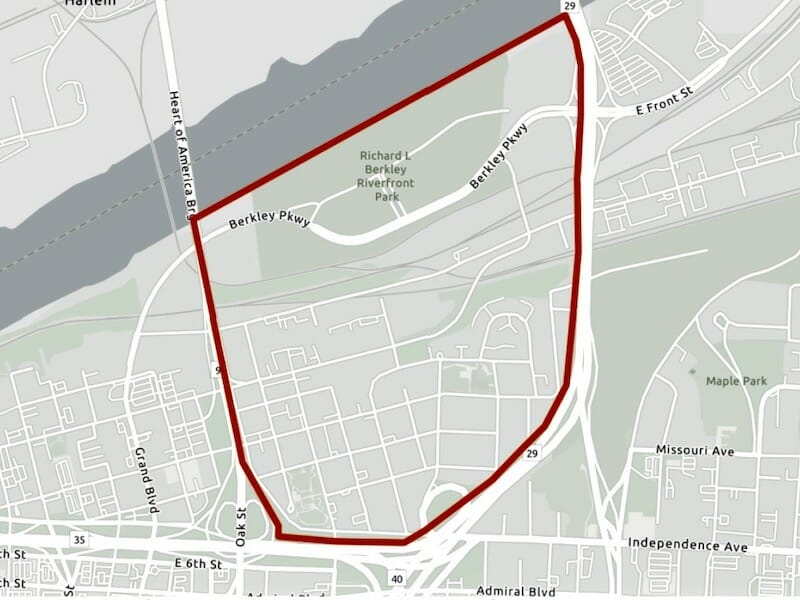
It comes at a time when hundreds of millions of dollars in new investments are happening, including 1,000 apartments, a hotel, an 11,500-seat professional soccer stadium, a beer garden, the renovation of Bally’s KC casino and the extension of the streetcar.
“The riverfront streetcar extension and construction of the KC Current stadium will bring hundreds of thousands of new visitors to the riverfront,” according to MARC.
“Improved connectivity will support the vibrant, walkable, and green development of the riverfront by enabling more people to visit the area without using a car.”
The study was funded with $185,000 from the federally funded Planning Sustainable Places program administered by MARC. It’s expected to be completed late this year or early 2025.
Ultimately implementing connectivity improvements, particularly removing the at-grade railroad crossing at Lydia Avenue, will likely cost tens of millions of dollars and require substantial federal assistance.
Meredith Hoenes, Port KC spokesperson, said it’s too early to discuss how any recommendations would be funded.
“The study’s results will lead us down the correct funding paths,” she said.
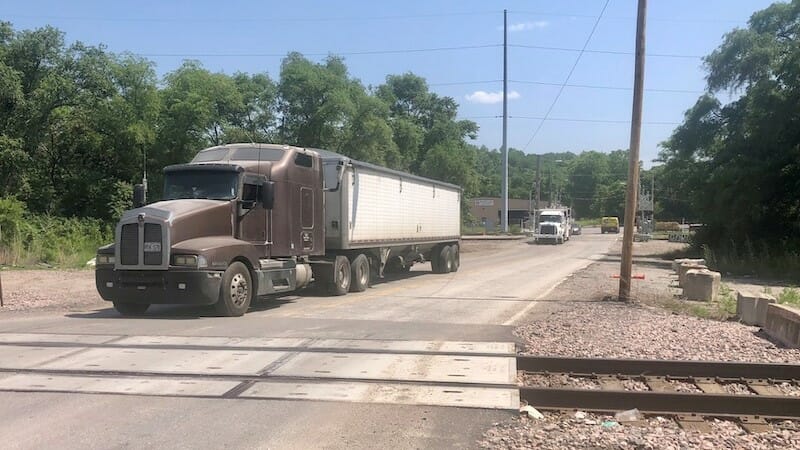
A big focus of the study is Lydia Avenue, a primary street that helps link the riverfront with Columbus Park. Currently, it’s a raw, industrial road with no pedestrian accommodations and frequently blocked by trains and traversed by semi-trucks.
“Today, there are no connections for people walking or bicycling between the riverfront and Columbus Park,” according to the MARC application.
“A Columbus Park resident who wants to reach the riverfront on foot or by bicycle must use the Lydia Street roadway, where there are no sidewalks or shoulder, to cross four at-grade rail lines.
“The only other choice is to go several miles out of their way through the River Market to use the Grand Street Viaduct, which also does not have sidewalks or bicycle facilities today.”
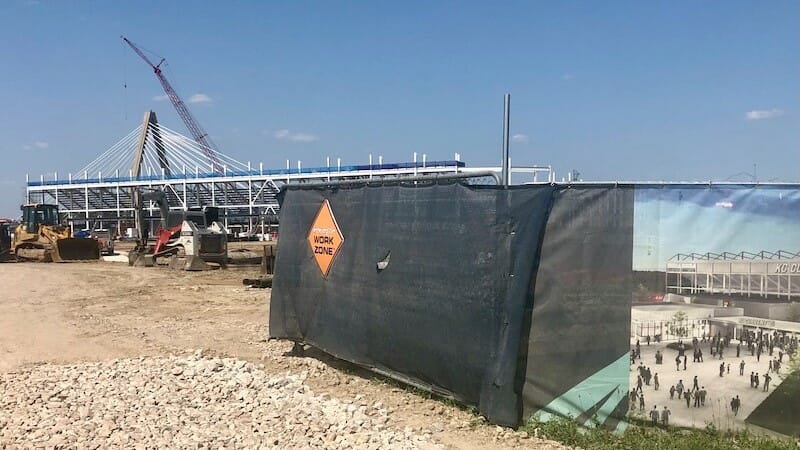
That Grand Viaduct situation is expected to change in 2025, when an adjoining bicycle and pedestrian bridge is scheduled to open. The new bridge is expected to be completed about the same time the riverfront streetcar extension to Berkley Park is finished.
One other benefit of providing grade separated crossings of the railroad tracks would be implementing a quiet zone that would reduce rail horns, “providing a quieter neighborhood for the enjoyment of all residents,” according to MARC.
An improved connection also would fill a gap in the proposed Greenline recreational trail that would circle downtown, and the Riverfront Heritage Trail and Kessler Park Trail.
The application emphasizes the social opportunities of better connecting the riverfront. It would provide better access to jobs for nearby residents and better odds for Port KC to attract affordable housing projects to the riverfront.
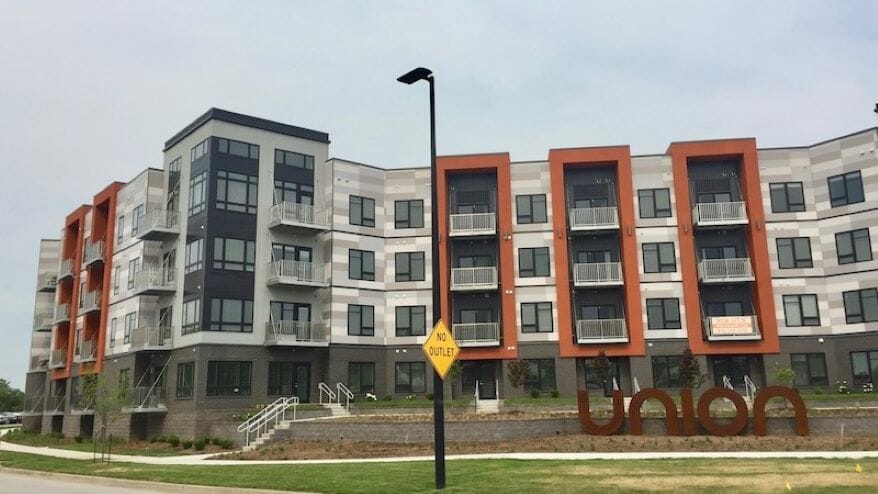
“One of the desired outcomes of this project is to improve connections to opportunities such as jobs at the new stadium and Bally’s Kansas Casino for residents in Columbus Park, Pendleton Heights, and the River Market,” according to the application.
While Port KC has received applications for at least two affordable housing developments at the riverfront, they failed to move forward after being turned down for low-income housing tax credits by the Missouri Housing Development Corp. (MHDC).
“Recent feedback from the MHDC has expressed concern about the proximity of the railroad tracks to potential sites for new housing,” according to the application.
“Port KC believes that exploring opportunities to create safer, separated crossings and improve connections… will assist in addressing these concerns and allow Port KC to be more successful in securing tax credits for the development of affordable housing.”
Flatland contributor Kevin Collison is the founder of CityScene KC, an online source for downtown news and issues.



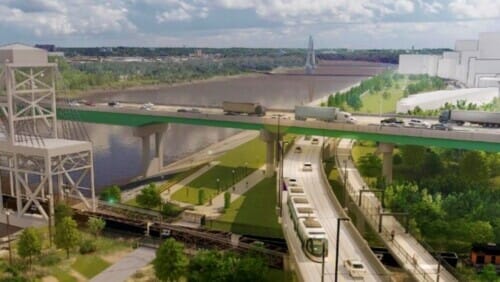
As a lady that loves Kansas City and what it has to offer, I would like to voice my opinion of moving the stadium from I-70 to North Kansas City or wherever, I believe the best location for it is where it currently situated!!!! It is far easier to acess that location than an area that will take fans through more city traffic. Besides if it is in North Kansas City, that is only going to confuse people more from out of state who still believe K.C. is in KS only!!